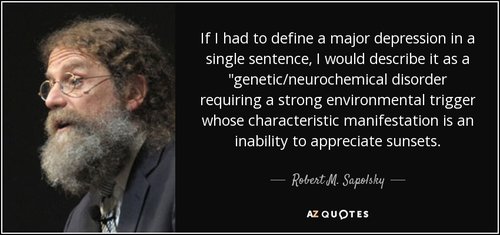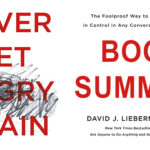(Video below the summary)
Summary:
– The meat and potatoes of human misery is depression. It’s extremely pervasive and the worst disease you can get.
– 15% will have a major episode in our lifes. Right now it’s number 4 cause of disability and by 2025 it will be number 2 according to W.H.O.
– The topic is going to be divided into 2. Biology and psychology and both need to be considered.
– The word is being used loosely so this video is about real depression and to help the ones that don’t come out the other end weeks or months later.
– There is 1) everyday depression at usual things, 2) reactive depression where you come out the other end after a bad experience, 3) major depression where you are flattened by the experience for a while after.
– It doesn’t take a lot to trigger another depression in people who experience major depression.
Symptoms of Major Depression
– Anhedonia: An inability to feel pleasure. A biochemical disorder with a genetic component early influences where someone can’t appreciate sunsets.
– Grief/Guilt: It takes on a delusional quality and thinking of past events that you could not let go of.
– Self-injury/Suicide.
– Psychomotor retardation: Exhaustion to do anything even thinking. Keep an eye on this phase because if they suddenly have the energy it could mean they’re planning suicide or something drastic.
Vegetative Symptoms:
– Trouble sleeping: Waking early is a classing sign.
– Eating: Decreased appetite.
– Activation of the stress response: Over activity of adrenaline. Stress hormones over-activated 24/7. Increased metabolic rate and increased muscle tone for example.
– Rhythmic pattern: They’ll fall into extreme depression for 2 years and come out and then it repeats a year and a half later maybe. Some get S.A.D. (Seasonal affective disorder) in winter. It’s all about biological clocks going out of whack.
Psychology:
– Neurotransmitters: Sender and receiver communicate with each other. Out of hundreds, it looks like a handful of them are affected during major depression.
– Neuropeneferin/MAO Inhibitors: Some drugs were discovered to reduce depression. But then high blood pressure medication did the opposite. It reduces anhedonia but later discovered that it has something to do with the psychomotor retardation.
– Dopamine: Looked like later this chemical did a better job. So dopamine is connected to the anhedonia.
– Seratonin: Again worked the same. It’s connected to guilt/grief. Even OCD behaviours can be controlled by this.
– Substance P: Connected to pain. The depression is reduced by numbing physical pain too.
– Triune Brain:
1. Reptilian brain takes care of mundane body issues.
2. Limbic system is about emotion which talks to the reptilian brain to release chemicals.
3. Cortex. Primates have the biggest cortex. Helps you do your taxes, music tastes, etc. This is where the depression starts and the rest of the brains tell each other that it’s as real as being mauled by an animal.
– Cingulotomy: When everything is tried and nothing works. Then you cut off the cortex from the other brains. However, it disconnects people to feel abstract pleasure.
– Hormones:
1. Thyroid shortage will result in major depression. So you need someone thinking about your nutrition when they’re looking at you.
2. Women have 2 times higher chances of depression than men. Women ruminate more on emotionally upsetting things.
3. Glucocorticoids are elevated in people with major depression. Somewhere around the 4th or 5th major depression where the person doesn’t come out of it on the other side. So your body gets depleted of dopamine… which can lead to…
4. Cushing’s disease.
Coming out the other side – Mourning and Melancholia (Sigmund Freud)
– When you come out the other side it’s called as mourning as you lost the depression.
– Melancholia is when you go down and stay down.
– Depression is aggression turned inward as you don’t have anyone to argue with.
Experimental psychology
– If you don’t have outlets or control of the situation or no shoulder to cry on, you fall into major depression. Learned helplessness.
– You have to see that the situation was awful but it is not the end all be all.
– Losing a parent before 10 years of age and you are more likely to get depression.
Amazon #ads

The Critical Link – Stress
– This is a disorder that has a genetic component but they’re not any more important than other components.
– If you have a history of major stressors in your life your risk of depression goes up. There is a 30 fold difference if you have a bad gene.
– Glucocorticoids regulate the function of this gene.
Disclaimer: This is as real of a biological disorder as diabete is.





